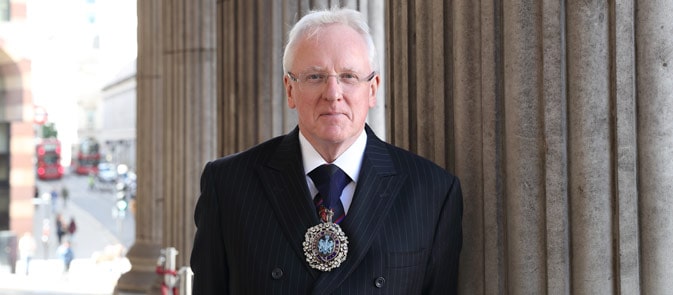The Right Honourable Lord Mayor of the City of London, Alderman Dr Andrew Parmley
The Lord Mayor of the City of London is singing Dublin’s praises on his trip around Ireland discussing Irish-British relationships post-Brexit.
In recent months Ireland has seen an upsurge in business interest from UK-based companies, not only in terms of actual business interaction, more so Dublin being the new EU hub post-Brexit. Behemoths such as JPMorgan and Lloyd’s of London already have Dublin in their sights for European-HQ establishment.
Ireland’s relationship with the UK has been a healthy one and will continue to remain so after Brexit, says the Lord Mayor of the City of London, Dr Andrew Parmley: “It’s going to be a historic moment. The City of London Mace is with us on this trip. It’s very rare to take it outside the Square Mile but it’s come over to Ireland as a sign and a symbol of the strength of the relationship between Ireland and the UK.”
Mr Parmley’s visit to Ireland, which began yesterday and finishes today, includes a meeting with Tánaiste Frances Fitzgerald, the Governor of the Central Bank Philip R. Lane, the Lord Mayor of Dublin Micheál MacDonncha and some cultural visits to museums and heritage centres.
He sees Dublin currently being a natural base for London-based firms on the move post-exodus.
“The truth of the matter is, unless we come to some sort of clear direction of travel over the question, particularly of transition, before the end of this year, it’s inevitable that we’re going to see some jobs leaving London seeking a new home.
“From my point of view, if it’s going to find a new home in Europe, then I think Dublin is going to be the place of choice. We’re told that it may well be Frankfurt, or it will be Paris.
“I think based on the language and based on the long trading relationship that we have together and the great warmth between the two nations, and the fact that we’ve been working together long before the European Union was a twinkle in the eye, [Dublin] is a natural place for people to come to.”
However, in the overall scheme of things, Europe might not be on the radar of London multinationals as Mr Parmley sees ventures further afield as potential prospects.
“Actually, in the bigger picture, I think you’re more likely to see business moving completely out of Europe and maybe to New York, Singapore or Hong Kong. But if we’re staying in Europe, I would think Dublin is going to be on top of our list.”
London won’t be shaken by any sort of exodus. Its position on the world stage is still a huge draw and attractive prospect for business activity.
“London is the number-one global financial centre and it will remain so. If there’s a little bit of fragmentation, so be it, but we’re forever reinventing ourselves and through the creation of new instruments in finance – FinTech, prevention of cybercrime, green bond issuance – we continue to grow.
“And in fact as we sit here, the workforce in the Square Mile is 450,000. By 2030 we’re expecting that to rise to 575,000. So rather than London suffering, it will reinvent itself and continue to develop”, the mayor says resolutely.
Mr Parmely went on to explain that everyone, including businesses, shareholders, regulators, has contingency plans in place for the departure and everyone will know what they’re doing and their roles when the eventual event occurs.
Ireland’s low corporation tax is always a point raised yet London’s mayor suggests it has far more to do with talent and the English language in Ireland. And for good measure, he also threw in the “innate beauty of the Irish people” with his advantageous highlights of moving across the Irish Sea. A point I’m sure we’d be happy to digest.
The border is a contentious issue among negotiations but both sides would do well to maintain common transport links already in place as Irish-UK trading sees over €1 billion a week generated.
“In terms of the border, this is probably one of the more difficult issues. But Her Majesty’s Government has made it very clear from the start that this was a key factor in the negotiation process.
“Definitely for us, we do not wish to see a hard-infrastructure border. We want to see the Common Travel Area (CTA) maintained.
“It’s going to be difficult working out how to manage the border, but it’s not beyond the wit of man.”
With a major metropolis such as London looking to Dublin, talks and relationships are even more pivotal at this time.



